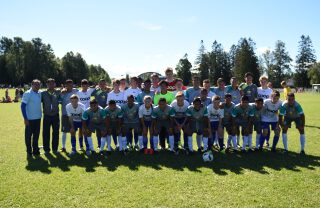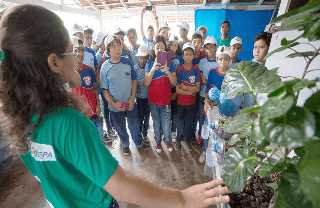Hydro Alunorte
Since the beginning of its operations, Hydro Alunorte has grown a lot, always investing in the social development of the region of Barcarena.
Social projects focus on income generation and professional training. An example is “Plasticultura”, where tubes of heat exchangers discarded from the factory are reused as a structure for assembling better quality greenhouses and providing low cost horticulture.
The company also supports the project of the “Cooperativa de Costura e Moda de Barcarena (Coopermodas)”, where women from the São Francisco community receive professional training in cutting, sewing and management issues.
Combining Brazil’s passion for football, Hydro Alunorte’s aluminium refinery’s education program “Bola pra Frente, Educação pra Gente” has been transforming the lives of the young people living in the Barcarena municipality for over 15 years. The project encourages good school performance through sports practice. The football team of the project, Alunorte Rain Forest (ARF), participates in the annual Norway Cup, one of the largest children’s football tournaments in the world. The project involves more than 2,500 students each academic year, through lectures, social and environmental competitions and sports activities.
Albras
Through its social programs, Albras encourages education, health, professional qualifications and the opportunity to generate employment and income, to make employees feel more involved and to encourage solidarity.
One of these stand out initiatives is the Family Mechanized Agriculture Program (PAFAM), in which Albras provides farmers with training, technical advice and modern equipment so that through technology and new production methods, their income can be improved. This initiative is being developed in partnership with other institutions, such as Sebrae and Embrapa Amazônia Oriental, and has already benefited more than 1,600 people.
Albras also supports the educational program “Albras Mais Perto de Você – Educação Ambiental” which brings together students from public and private schools in Barcerena to visit the Albras Botanic Garden. The botanical nursery, which is a 38-hectare green area and is home to the third largest collection of palm trees in Brazil, is a great learning space for environment education where students gain knowledge about environmental awareness through play activities and contact with nature.
In 1996, trials were undertaken on a former pond; after working the surface to produce smaller nodules, plots were treated with gypsum. Just over a year after the gypsum was spread, poultry manure and ammonium sulphate was spread. Three months later seeding (including Bermuda Grass, Brachiaria, Lead Tree, Castor Bean and Logwood) was undertaken.
In 2004 a study found 53 species belonging to 28 families, dominated by Guinea Grass, Lead Tree and Christmas Bush; only Logwood and Lead Tree remained from the original species planted. The success of the Lead Tree is attributable to its nitrogen fixation ability. The growth form of the vegetation, slender trees, grasses, climbers and runners with rhizomes and stolons is typical of an early pioneer stage in succession and development.
In 2005 parts of the area were reinvigorated by additional gypsum and chicken manure and reseeding with Brachiaria, Bonavista Bean and Guinea Grass. By mid – 2011 there had been a dramatic improvement in the growth across the entire area; 56 species were found which is comparable to a “dry limestone forest” in Jamaica.
Following this trial, Rio Tinto adopted a very similar approach on the remaining ponds, which still comprised bare bauxite residue, and excellent revegetation has been found after three years.

